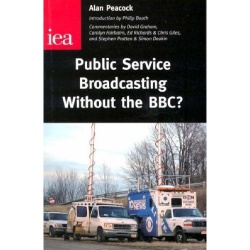BBC: Institute of Economic Affairs

The Institute of Economic Affairs (IEA) is a seminal free market think-tank based in London. Through its promotion of free market theorists like Milton Friedman it provided an intellectual rationale for business friendly political and economic reforms introduced by the Thatcher government in the UK - a political programme which later came to be known as neoliberalism.
IEA and the BBC
Media academic Tom O'Malley notes that, ‘There had been little sustained academic or national political interest in the technicalities of broadcast economics in the UK until the advent of the Thatcher government’, but that, ‘The IEA had published occasional pieces’. [1]
The Key Players
Figures writing for and closely associated with the IEA had a key role in the attacks on the BBC and public service broadcasting more generally which began in the 1980s. Not least of these was the economist Alan Peacock, who was a Trustee of the IEA and also served as Vice-Chancellor of the University of Buckingham – Britain’s only private university which was closely affiliated with the IEA. Peacock was appointed by the Thatcher government to head the Committee on Financing the BBC, better known as the Peacock Committee.
Another IEA affiliated member of the Peacock Committee was Samuel Brittan, who was appointed to the Committee by his brother, the Home Secretary Leon Brittan. He was ‘closely affiliated with the IEA and had published under the IEA’s imprint.’ [2] Chris Horrie and Steve Clarke note that whilst the committee was conducting its inquiry, Samuel Brittan was close contact with the fellow financial journalist and neoliberal ideologue Peter Jay:
Brittan had developed his theories with Peter Jay, the former economics editor of The Times and presenter of LWT’s Weekend World. Jay was not on the committee, but had strong thought of his own on the future of television. He and Brittan were to spend long sessions together at Jay’s Ealing home, effectively forming their own private committee, and wildly exceeding Peacock’s original brief. [3]
Peacock, Brittan and the other members of the committee were advised by Cento Veljanovski, a member of the IEA who later became its Research Editorial Director. [4] In 1989 Veljanovski edited the IEA book Freedom in Broadcasting (which also happened to be the title of Rupert Murdoch's notorious MacTaggart Lecture that same year). The book included contributions from Samuel Brittan and Alan Peacock. [5]
The Thatcher government was advised on broadcasting by the IEA member and former Panorama producer David Graham, who had written articles on broadcasting for the IEA. According to the authors of The Battle for the BBC, Brian Griffiths, the head of Thatcher’s Policy Unit, invited Graham to Downing Street ‘on several occasions to discuss broadcasting. Griffiths was interested in the economic questions: how the industry was structured; who did what; how people were paid for what they did.’[6]
Relevant Publications
Richard D North, The BBC's Climate Change Meltdown (web publication) (Institute of Economic Affairs, 24 March 2006)
Alan Peacock (ed.), Public Service Broadcasting Without the BBC? (London: Institute of Economic Affairs, 2006)
Raymond B. Gallagher, Is American television that bad?: fact and fantasy in the free broadcasting market (London: Institute of Economic Affairs, 1988)
Cento Veljanovski (ed.), Freedom in broadcasting (London : Institute of Economic Affairs, 1989)
Cento Veljanovski and W.D.Bishop, Choice by cable: the economics of a new era in television (London: Institute of Economic Affairs, 1983)
Sir Sydney Caine, Paying for TV? (London: Institute of Economic Affairs, 1968)
Wilfred Altman, Denis Thomas & David Sawers, TV: from monopoly to competition (London: Institute of Economic Affairs, 1962)
Notes
- ↑ Tom O'Malley, Closedown?: The BBC and Government Broadcasting Policy 1979-92 (London: Pluto Press, 1994) p.88
- ↑ Tom O'Malley, Closedown?: The BBC and Government Broadcasting Policy 1979-92 (London: Pluto Press, 1994) p.18
- ↑ Chris Horrie and Steve Clarke, Fuzzy Monsters – Fear and Loathing at the BBC (London: William Heinemann, 1994) p.37
- ↑ Tom O'Malley, Closedown?: The BBC and Government Broadcasting Policy 1979-92 (London: Pluto Press, 1994) p.18
- ↑ Alan Peacock contributed two chapters: 'Competition in broadcasting' and 'The Peacock Report: some unanswered questions'. Samuel Brittan's chapter was called 'The future of public service broadcasting'.
- ↑ Steven Barnett & Andrew Curry, The Battle for the BBC: A British Broadcasting Conspiracy? (London: Aurum Press, 1994) p.61